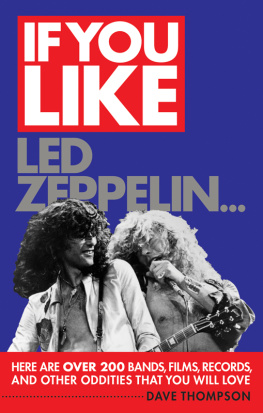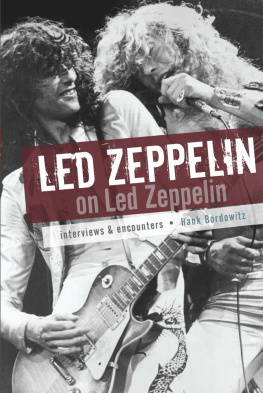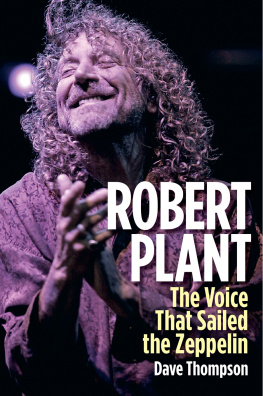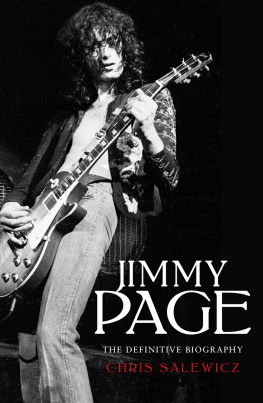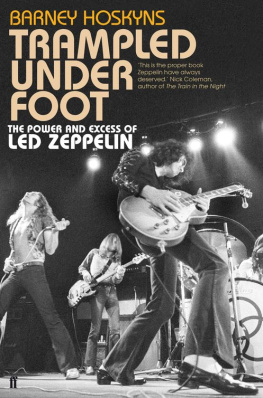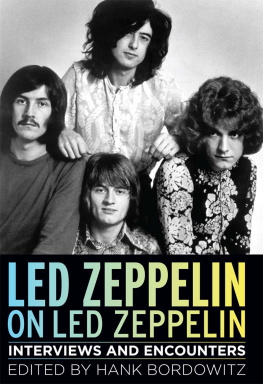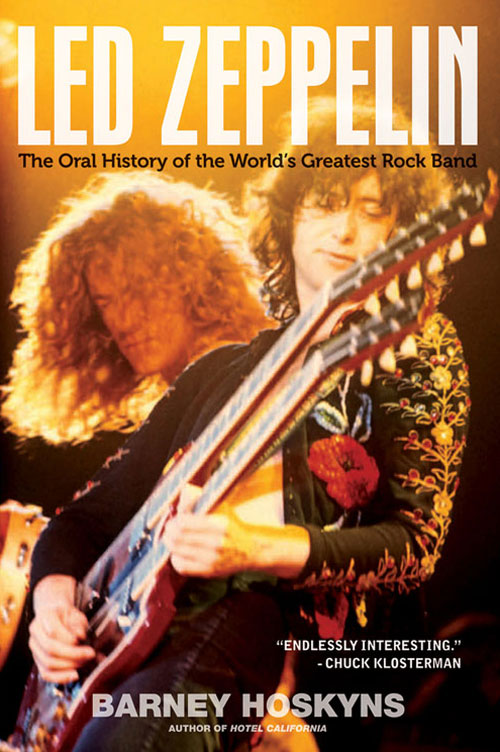
ALSO BY BARNEY HOSKYNS
Hotel California: The True-Life Adventures of Crosby, Stills, Nash, Young, Mitchell, Taylor, Browne, Ronstadt, Geffen, the Eagles, and Their Many Friends
Across the Great Divide: The Band and America
Waiting for the Sun: A Rock and Roll History of Los Angeles
Lowside of the Road: A Life of Tom Waits
Glam!: (David) Bowie, (Marc) Bolan and the Glitter Rock Revolution

This book is printed on acid-free paper. 
Copyright 2012 by Barney Hoskyns. All rights reserved
Cover Design: Susan Olinsky
Cover Image: Pictorial Press/Alamy
Published by John Wiley & Sons, Inc., Hoboken, New Jersey
Published simultaneously in Canada
No part of this publication may be reproduced, stored in a retrieval system, or transmitted in any form or by any means, electronic, mechanical, photocopying, recording, scanning, or otherwise, except as permitted under Section 107 or 108 of the 1976 United States Copyright Act, without either the prior written permission of the Publisher, or authorization through payment of the appropriate per-copy fee to the Copyright Clearance Center, 222 Rosewood Drive, Danvers, MA 01923, (978) 750-8400, fax (978) 646-8600, or on the web at www.copyright.com . Requests to the Publisher for permission should be addressed to the Permissions Department, John Wiley & Sons, Inc., 111 River Street, Hoboken, NJ 07030, (201) 748-6011, fax (201) 748-6008, or online at http://www.wiley.com/go/permissions .
Limit of Liability/Disclaimer of Warranty: While the publisher and the author have used their best efforts in preparing this book, they make no representations or warranties with respect to the accuracy or completeness of the contents of this book and specifically disclaim any implied warranties of merchantability or fitness for a particular purpose. No warranty may be created or extended by sales representatives or written sales materials. The advice and strategies contained herein may not be suitable for your situation. You should consult with a professional where appropriate. Neither the publisher nor the author shall be liable for any loss of profit or any other commercial damages, including but not limited to special, incidental, consequential, or other damages.
For general information about our other products and services, please contact our Customer Care Department within the United States at (800) 762-2974, outside the United States at (317) 572-3993 or fax (317) 572-4002.
Wiley also publishes its books in a variety of electronic formats and by print-on-demand. Some content that appears in standard print versions of this book may not be available in other formats. For more information about Wiley products, visit us at www.wiley.com .
Library of Congress Cataloging-in-Publication Data:
Hoskyns, Barney.
Led Zeppelin : the oral history of the world's greatest rock band/Barney Hoskyns.
p. cm.
Includes bibliographical references and index.
ISBN 978-0-470-89432-3 (cloth); ISBN 978-1-118-22111-2 (ebk);
ISBN 978-1-118-23490-7 (ebk); ISBN 978-1-118-25955-9 (ebk)
1. Led Zeppelin (Musical group) 2. Rock musiciansEnglandBiography. I. Title.
ML421.L4H66 2012
782.421660922dc23
[B]
2012016374
For Mat Snow
What did Led Zeppelin prove? That great music is always the best excuse for bad behavior.
Kim Fowley
PREFACE
In Through the Out Door: The Biggest Unknown Group in the World
Led Zeppelin was unobtainable and unattainable, and we very seldom talked about it. Basically, the myth propagated itself.
Robert Plant to the author, May 2003
On a white-hot morning in Twentynine Palmsthe Mojave desert town name-checked on Robert Plant's 1993 album Fate of Nations I can see a number of the strangely shaped Joshua trees that lend their name to the nearby national park, the same place where, on Cap Rock in 1969, Gram Parsons dropped acid with Keith Richards and Anita Pallenberg.
Ever since Parsons OD'd and died in Joshua Tree itselftwenty-five miles east along Route 62the whole area has become one of California's holy rock sites. So it's fitting that as I fill up my rental compact at a Twentynine Palms gas station, I hear the booming strains of a rock song approaching. Within seconds, I know it as a staple of classic-rock radioan evergreen of easy-riding highway rockand the pop snob in me groans. Pulling up next to me is a mirror-shaded dude astride a black beast of a motorcycle, its wheels flanked by vast speaker bins that punch out the song I know so well:
Babe babe babe babe babe babe 'm bayeebee I'm gonna LEEEEAVE you
The owner of the song's strangulated male voice ain't joking, woman , he's really got to ramble rather like this man in his sunglasses. The voice soundtracks the guy's chrome-horse freedom on a song recorded almost four decades ago, and he is making sure we all know it. I look at him and want to dismiss him as an idiot. He's at least as old as the song, and if he took the shades off, he might be old enough to have seen Led Zeppelin in their pomp, maybe at the L.A. Forum, possibly at the Long Beach Arena or the San Diego Sports Arenathe huge venues where the West was won. Perhaps he saw Zep's last, occluded U.S. show at the Oakland Coliseum in the summer of '77. Or he may only have seen the band in his mind, back when he was a beer-chuggin' adolescent spellbound by their satanic limey majesty, one of the vast legion of disciples who worshipped them as your overlords.
It doesn't really matter which it is, because I understand the mythic potency of the music that's blasting from his speakers. And slowly I start to see him, in all his delusions, as oddly heroic. Like Robert Plant on Babe, I'm Gonna Leave You, he's gotta keep moving, hitting the highway again, on to the next town and the next chick. Maybe he's heading east, farther into the empty Mojave, where he can feel the heat of your desert heart (Twentynine Palms), and then on to Arizona or New Mexico or just someplace where he can hole up and be free. Alternatively, he could be heading west to gaze out on the infinite Pacific and leave terra firma behind him. He could be a gung-ho libertarian, a man for whom Babe, I'm Gonna Leave You says, simply, I have no responsibility to anyone except me . Or he could just be a weekend warrior, escaping the deep dreariness of his nine-to-five life.
As the song's frenzied descending chords fade over Plant's frayed larynx, I silently bond with Mr. Get the Led Out, as I recall my own first exposure to the second track on Zeppelin's astounding debut album. (When I asked John Paul Jones which album he would play to someone who'd never heard the band, he said, The first one. It's all there, right from the word go. I'm not sure he wasn't right.) I understand why this and other songs became battle cries for a lost generation of disowned teenagers searching for dark magic in their suburban shopping-mall lives. I understand how Zeppelin became a new Fab Four for the younger siblings who missed out on Beatlemaniaand for whom the Rolling Stones were just too Cte d'Azur for their own good.
For what you hear on Babe, I'm Gonna Leave You and every great Zeppelin track is not just poweramplified aggression matched by priapic swaggerbut yearning, journeying, questing for an ideal.
There is a point in your life, Chuck Klosterman wrote in Killing Yourself to Live , when you hear songs like The Ocean' and Out on the Tiles' and Kashmir,' and you suddenly find yourself feeling like these songs are actively making you into the person you want to be. It does not matter if you've heard those songs a hundred times and felt nothing in the past, and it does not matter if you don't normally like rock 'n' roll and just happened to overhear it in somebody else's dorm room. We all still meet at the same vortex: for whatever the reason, there is a point in the male maturation process when the music of Led Zeppelin sounds like the perfect actualisation of the perfectly cool you. For the scurrilous Svengali Kim Fowley, who consorted with them in their Hyatt House heyday, Led Zeppelin were both dangerous and spiritualand you couldn't have one without the other. Another way of saying that is to resort to hoary metaphors of light and dark, good and evil. Certainly, it's difficult to talk of Zeppelin and not speak of evil; many of those interviewed for this oral history do just that. And while it's too easy to identify Robert Plant and John Paul Jones with the light and Jimmy Page and John Bonham (and Peter Grant and Richard Cole, et al.) with the dark, the occult appeal of Page as a guitar magus steeped in the nefarious teachings of Aleister Crowley remains central to Zeppelin's appeal to adolescents as they strive to create identities for themselves in a world that never recovered from the failure of America's hippie dream.
Next page

